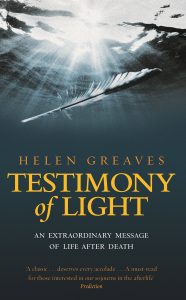 Is there an afterlife beyond this human one? What is it like? If we knew more about the afterlife, could that guide our human life here and now? This book offers some of the most convincing answers to these questions that I have found.
Is there an afterlife beyond this human one? What is it like? If we knew more about the afterlife, could that guide our human life here and now? This book offers some of the most convincing answers to these questions that I have found.
There are two voices in this book: the writer is Helen Greaves, but she is transcribing the voice of her dead friend, Frances Banks. Both were Anglican nuns, colleagues and friends: the book is written in the mid-1960s. Soon after Frances’ death, Helen started to receive a series of messages from her, describing her experiences in the afterlife.
Reading this book made me realise that my dominant images of the afterlife are quire flimsy and simplistic: a Heaven and Hell, loosely derived from the Old Testament and a lot of medieval art. Plus a bit of karma dogma from the East. Whereas Frances Banks describes a more subtle, encouraging afterlife, much closer to the original teachings of Jesus as explored in the work of Neil Douglas Klotz.
After death, Frances joins the team in a sort of Rest Home:
“Souls are brought here from earth and from other places… when they are ready…”
“Many who arrive here are either completely overwhelmed by the fact of a further existence, or disillusioned because … they have envisaged a heaven … (where) henceforth no efforts would be required from them.”
An example of this further work is “to right the wrongs they have done in their earth lives by concentrated thoughts of forgiveness and compassion.”
What we might call Heaven is not a static condition, but a long, exciting process of expansion:
“Our ‘inner eyes’ are opened gradually or swiftly to the errors of our old patterns of thinking and acting. We are allowed to progress into such experiences as will help us to put right these errors.”
“There are no tenets, no hard and fast rules… All is individual, yet all is for the good of the whole.”
“Each soul and each group moves onward towards greater expansion… Yet all the same time… directs ‘backward’ to the plane below,… the fruits of its knowledge.”
Her experience supports the idea of the soul’s life before and after human form, and of reincarnation. She believes there is “a Pattern and a Plan”, and that “the soul needs to ‘project’ some part of itself back into the denser environment of earth in repeated attempts to master the trials and stresses of those vibrations.”
And she believes a soul chooses the key events of its forthcoming life, to give it the experiences it needs.
She reports a conversation with Pierre Curie who says: “Mankind… learns slowly and such slow progress with many mistakes brings pain. But if you regard life from the angle of an eternal process you get a different feeling about it. The Life Force is not expanded on only one terrestrial globe.” (p54)
Frances finds that Soul Groups are an important part of the journey: “We are members not of one group but of many…” these include our Family Group, and Groups of Interest, such as the arts, education, social service. Typically these groups will include souls in a human life, and souls in the afterlife. These groups will include people we know in earthly life, possibly those we find repellent, as well as those who we feel strongly drawn to.
The form of “hell” she describes is far more encouraging than the archetypal pit of flames. She writes about the Shadow Lands, but explains that people can move beyond them when they choose to turn to the “Light of Love”, and many helpers visit to help souls make this change.
So what can we learn from all this to guide our life in a body? Firstly, the idea that we are part of Soul Groups who want to share their wisdom with us, and learn from our experience. Secondly, that “the great purpose of life in matter is to illumine matter with Spirit”, and “the great secret of finding that Spirit was the ‘letting go’ of self.” Thirdly, that “the inner life of the soul within the body-mind on earth decides the first future ‘home’ on this level.” Fourthly, as one of her mentors says, “Prayers and good thoughts for those who have left the earth life, by their fellows still in incarnation are a great aid to our work here.”
Her experiences give a great sense of continuity and scope for progression. For example, there are the chances to understand much more deeply what happened during ones earthly life looking back at it, and actually to rectify mistakes one made. She also comments “That much of what we thought praiseworthy on earth is mediocre to us in the Light of wider knowledge, and conversely much for which we blamed ourselves and were blamed by others, is viewed here from a wider angle and even becomes merit!”
These are only brief fragments of a really fascinating narrative: worth reading from cover to cover.
Testimony of Light by Helen Greaves is published in the UK by Rider: ISBN1-8441-3135-1
